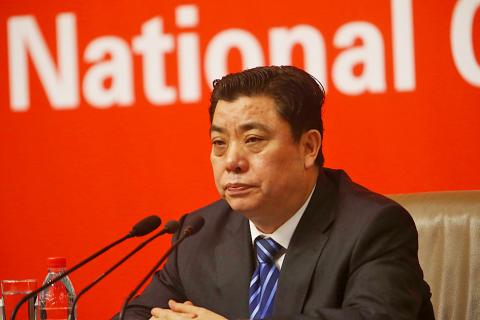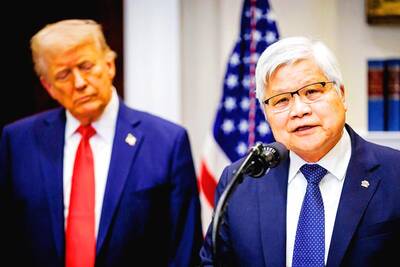China is using economic incentives to target 10 types of groups in Taiwan as part of its “united front” tactics, an unnamed government official said, citing national security intelligence.
The official said the groups targeted for engagement are local townships, young people and students, Chinese spouses of Taiwanese, Aborigines, pro-China political parties and groups, temples, descendants of Chinese who retain roots in China, labor groups, farmers’ and fishermens’ associations, and military veterans.
The government had previously estimated that China spends at least NT$10 billion (US$337.8 million) per year enticing Taiwanese to join united front efforts, but they believe that there might be more “invisible funding.”

Photo: CNA
China uses economic incentives when cultivating Chinese spouses, Aboriginal leaders, and local township and religious organizations, the official said, adding that Beijing might provide free visits to China or direct benefits to improve China’s approval rating.
China is also attempting to establish internal aid in Taiwan to direct public affairs and political activities, the official said.
Different levels of officials from China’s Taiwan Affairs Office (TAO), United Front Work Department (UFWD) of the Chinese Communist Party’s Central Committee and other groups have used Taiwan’s pro-unification groups and pro-China associations to arrange visits to Taiwan, gradually affecting exchanges using united front strategies, another unnamed source familiar with the matter said.
Trade groups, Chinese-funded firms and the local offices of Chinese businesses have members who also hold Chinese government positions, the source said, adding that these people cooperate with instructions from China.
During former president Ma Ying-jeou’s (馬英九) administration, Xiamen University’s Taiwan Research Institute and other Chinese think tanks researched Taiwan’s political and economic development and social sentiment for a long period in the name of academic cooperation and field research, the source said.
The organizations claimed that hotel costs were too high and rented homes in Taiwan for professors and students, the source said, adding that the groups used this opportunity to collect intelligence.
A suspected “price list” set by the TAO has emerged in a case involving New Party spokesman Wang Ping-chung (王炳忠), a national security official said.
Prosecutors have also found several million yuan in the accounts of other pro-China political parties and groups, the official said.
China has also hinted to political party members that if they gather military information in Taiwan, China would compensate them generously, while others have traveled to China to interact with national security officials and accept funds, the official added.
These cases are difficult to investigate, because it is not easy to prove that the money in those accounts was given by Chinese intelligence agencies or agencies involved with Taiwan, the official said.
Meanwhile, Chinese divisions involved with Taiwan are spread throughout several Chinese party, government and military divisions, including the UFWD, the Taiwan affairs system, think tanks and other divisions, the official said.
Taiwan has continuously tracked China’s attempts to influence Taiwanese politics and society, and has reacted appropriately, they added.

ENDEAVOR MANTA: The ship is programmed to automatically return to its designated home port and would self-destruct if seized by another party The Endeavor Manta, Taiwan’s first military-specification uncrewed surface vehicle (USV) tailor-made to operate in the Taiwan Strait in a bid to bolster the nation’s asymmetric combat capabilities made its first appearance at Kaohsiung’s Singda Harbor yesterday. Taking inspiration from Ukraine’s navy, which is using USVs to force Russia’s Black Sea fleet to take shelter within its own ports, CSBC Taiwan (台灣國際造船) established a research and development unit on USVs last year, CSBC chairman Huang Cheng-hung (黃正弘) said. With the exception of the satellite guidance system and the outboard motors — which were purchased from foreign companies that were not affiliated with Chinese-funded

PERMIT REVOKED: The influencer at a news conference said the National Immigration Agency was infringing on human rights and persecuting Chinese spouses Chinese influencer “Yaya in Taiwan” (亞亞在台灣) yesterday evening voluntarily left Taiwan, despite saying yesterday morning that she had “no intention” of leaving after her residence permit was revoked over her comments on Taiwan being “unified” with China by military force. The Ministry of the Interior yesterday had said that it could forcibly deport the influencer at midnight, but was considering taking a more flexible approach and beginning procedures this morning. The influencer, whose given name is Liu Zhenya (劉振亞), departed on a 8:45pm flight from Taipei International Airport (Songshan airport) to Fuzhou, China. Liu held a news conference at the airport at 7pm,

KAOHSIUNG CEREMONY: The contract chipmaker is planning to build 5 fabs in the southern city to gradually expand its 2-nanometer chip capacity Taiwan Semiconductor Manufacturing Co (TSMC, 台積電), the world’s biggest contract chipmaker, yesterday confirmed that it plans to hold a ceremony on March 31 to unveil a capacity expansion plan for its most advanced 2-nanometer chips in Kaohsiung, demonstrating its commitment to further investment at home. The ceremony is to be hosted by TSMC cochief operating officer Y.P. Chyn (秦永沛). It did not disclose whether Premier Cho Jung-tai (卓榮泰) and high-ranking government officials would attend the ceremony. More details are to be released next week, it said. The chipmaker’s latest move came after its announcement earlier this month of an additional US$100 billion

Authorities yesterday elaborated on the rules governing Employment Gold Cards after a US cardholder was barred from entering Taiwan for six years after working without a permit during a 2023 visit. American YouTuber LeLe Farley was barred after already being approved for an Employment Gold Card, he said in a video published on his channel on Saturday. Farley, who has more than 420,000 subscribers on his YouTube channel, was approved for his Gold Card last month, but was told at a check-in counter at the Los Angeles International Airport that he could not enter Taiwan. That was because he previously participated in two